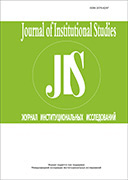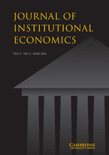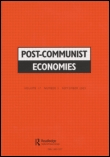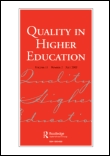
Journal of Institutional Studies
Scope & Guideline
Pioneering innovative perspectives in institutional studies.
Introduction
Aims and Scopes
- Institutional Analysis and Change:
The journal emphasizes the study of institutions—formal and informal rules, norms, and practices—and how they evolve or transform over time. This includes critical examinations of institutional change in various contexts, such as governance, economic policy, and social services. - Interdisciplinary Research:
The journal encourages contributions from various disciplines, including economics, political science, sociology, and law, allowing for a comprehensive understanding of institutions and their multifaceted impacts. - Focus on Regional and National Contexts:
Many published studies analyze institutions within specific regional or national frameworks, particularly focusing on the Russian context, which provides insights into unique institutional challenges and developments. - Methodological Diversity:
The journal embraces a range of methodologies, including empirical research, econometric analyses, qualitative studies, and theoretical explorations, allowing for robust discussions on institutional dynamics. - Societal Implications of Institutional Frameworks:
There is a consistent focus on how institutions affect social trust, public policy, economic behavior, and community engagement, highlighting the societal implications of institutional arrangements.
Trending and Emerging
- Digital Transformation and Institutions:
There is a notable increase in research addressing how digital technologies are reshaping institutional frameworks, governance, and public policy, reflecting the growing importance of the digital economy in institutional studies. - Environmental Institutions and Sustainability:
Recent publications highlight the role of institutions in fostering sustainable practices and environmental governance, indicating a trend towards integrating ecological concerns into institutional analysis. - Trust and Institutional Legitimacy:
The focus on institutional trust and legitimacy is emerging as a critical theme, especially in light of recent global crises, suggesting a need for institutions to adapt and maintain credibility among stakeholders. - Health Institutions and Crisis Response:
The COVID-19 pandemic has spurred a growing interest in the analysis of health institutions, their responses to crises, and the implications for public health policy and governance. - Interplay of Global and Local Institutions:
An increasing number of studies are exploring the interactions between global institutional frameworks and local practices, emphasizing the complexity of governance in a globalized world.
Declining or Waning
- Historical Analysis of Institutions:
While historical perspectives on institutions have been a significant area of focus, recent publications suggest a decline in this theme, as the journal increasingly prioritizes contemporary institutional issues and their immediate implications. - Narrow Economic Theories:
There seems to be a waning interest in highly specialized or narrow economic theories that do not incorporate broader institutional analysis, as the journal shifts towards more integrative approaches that consider various factors influencing institutions. - Overemphasis on Local Case Studies:
Previously, there was a strong emphasis on localized case studies. However, recent trends indicate a shift towards larger-scale analyses and comparative studies that provide broader insights into institutional phenomena. - Traditional Governance Models:
The exploration of traditional governance models is becoming less frequent, possibly due to the growing focus on innovative governance approaches and the impact of digital transformation on institutional frameworks. - Static Institutional Frameworks:
Research focusing on static views of institutions, without considering their dynamic nature and adaptability in changing environments, is becoming less prevalent, as the journal now seeks to explore more fluid and evolving institutional concepts.
Similar Journals

Journal of Institutional Economics
Bridging Economics and Institutional TheoryJournal of Institutional Economics, published by Cambridge University Press, stands as a premier forum for the dissemination of research at the intersection of economics, institutions, and governance. With an ISSN of 1744-1374 and E-ISSN 1744-1382, this journal has established itself as a vital resource within the academic community, achieving an impressive Q1 ranking in the field of Economics, Econometrics and Finance as of 2023. The journal's focus on institutional analysis not only enhances our understanding of economic phenomena but also fosters interdisciplinary dialogue among scholars and practitioners alike. With a commendable rank of 39 out of 288 in Scopus rankings, placing it in the 86th percentile, the Journal of Institutional Economics provides access to groundbreaking research that holds significant implications for policy and decision-making. Researchers, professionals, and students engaged in the study of economic systems will find this journal an invaluable addition to their academic resources.

Transnational Corporations Review
Exploring the Dynamics of Global BusinessTransnational Corporations Review is a prestigious academic journal published by Elsevier Science Inc., housed in the Netherlands, which has established itself as a critical forum for the examination and analysis of transnational corporations’ roles in the global economy. With an impressive impact factor and consistent rankings within the Q2 and Q3 categories across fields such as Business and International Management, Development, and Finance, this journal offers invaluable insights that appeal to researchers, professionals, and students alike. The journal spans a broad spectrum of critical topics, focusing on the intersection of corporate strategies and international market dynamics and actively encourages contributions that enhance our understanding of economic and business environments. With a commitment to fostering scholarly discourse, Transnational Corporations Review serves as a vital resource for anyone interested in the complexities and challenges of contemporary transnational business operations. Current and past issues can be accessed via reputable academic databases, ensuring that this journal remains visible and impactful within the academic community.

POST-COMMUNIST ECONOMIES
Championing Rigorous Research in Economic TransitionPOST-COMMUNIST ECONOMIES is a leading academic journal dedicated to the exploration and analysis of economic transformations in post-communist societies, published by Routledge Journals, Taylor & Francis Ltd. With an Impact Factor that underscores its influence, this journal is ranked in the Q2 category of Economics and Econometrics for 2023, placing it among the top 25% of its field. It holds a respectable position in Scopus rankings, rated #181 out of 716 in its category, reflecting its commitment to high-quality, rigorous research and discourse. The journal publishes articles that delve into the economic, social, and political challenges faced by transitioning economies, promoting a multidisciplinary dialogue among researchers, practitioners, and policymakers alike. With its open access options and an extensive publication history spanning from 1999 to 2024, POST-COMMUNIST ECONOMIES serves as a vital resource for anyone interested in understanding the dynamics of economic change in the post-communist context, fostering a deeper comprehension of the global economic landscape.

Economics of Governance
Exploring the Nexus of Governance and Economics.Economics of Governance (ISSN: 1435-6104; E-ISSN: 1435-8131) is a distinguished journal published by SPRINGER HEIDELBERG, dedicated to advancing the field of governance economics. Established in 2003, this journal explores the intricate relationships between governance structures and economic performance, making it a vital resource for researchers, practitioners, and policymakers alike. With its impressive categorization in Q3 in Business and International Management and Q2 in Economics, Econometrics, and Finance (miscellaneous) as of 2023, it stands as a prominent platform for innovative research. Although it operates without open access, it attracts a robust readership owing to its critical analyses and high-quality contributions, fostering an understanding of governance mechanisms in a globalized economy. The journal also receives recognition within Scopus, ranking #139 in General Economics and #323 in Business and International Management, reflecting its influence in shaping current discourse and research trends. For those devoted to the economics of governance, this journal is a crucial asset that continually encourages scholarly inquiry and professional development.

POLITICA Y GOBIERNO
Innovating Insights into Political Science and International RelationsPOLITICA Y GOBIERNO is a prominent academic journal published by the CENTRO DE INVESTIGACION Y DOCENCIA ECONOMICAS and primarily focuses on the dynamic fields of Political Science and International Relations. Since its inception, the journal has provided a vital platform for scholars and practitioners to disseminate their research, contributing significantly to the discourse surrounding governance and public policy. With a commendable Q2 ranking in the category of Political Science and International Relations, it is recognized for its rigorous academic standards and impactful contributions, particularly in the Latin American context. The journal is committed to exploring critical issues related to politics and government, fostering discussions that shape policy and civic engagement, while being indexed in Scopus with a ranking of 380 out of 706 in its field. Although it does not offer open access, its comprehensive analyses and thought-provoking articles remain essential reading for researchers, professionals, and students seeking to deepen their understanding of governance and political dynamics in Mexico and beyond. The journal can be accessed through institutional subscriptions, ensuring it remains a crucial resource in the study of socio-political processes.

Economics of Transition and Institutional Change
Exploring the nexus of economics and institutional evolution.Economics of Transition and Institutional Change is a dynamic academic journal published by WILEY, dedicated to exploring the intricate relationship between economic transitions and institutional modifications across diverse global contexts. Established in 2019, the journal aims to illuminate the mechanisms through which institutional change influences economic performance, particularly in transitional economies. With its ISSN 2577-6975 and E-ISSN 2577-6983, the journal provides a platform for researchers and economists to disseminate high-quality, peer-reviewed research that reflects contemporary issues in the field. Given its classification in the Q3 and Q2 quartiles for 2023 in both Economics and Econometrics, and broader categories involving Finance, it occupies a vital role within its academic niche, ensuring your work gains the attention it deserves. The journal offers open access options, making valuable research freely available to a wider audience, thereby enhancing its impact. Located in Hoboken, New Jersey, Economics of Transition and Institutional Change invites contributions that investigate theoretical and practical perspectives, ensuring a rich dialogue among scholars, practitioners, and policymakers.

Quality in Higher Education
Exploring Excellence in Higher EducationQuality in Higher Education is a premier journal dedicated to the critical examination of quality assurance and enhancement in higher education. Published by Routledge Journals, Taylor & Francis Ltd, this esteemed journal boasts a Q2 ranking in the Education category on Scopus, reflecting its significant contribution to the field, with a ranking of #483 out of 1543 in Social Sciences: Education and placing in the 68th percentile. With an ISSN of 1353-8322 and an E-ISSN of 1470-1081, the journal spans a diverse range of topics pertinent to educational researchers and practitioners from 1995 to 2024. It serves as an invaluable platform for innovative research, case studies, and critical discussions aimed at fostering effective quality practices in higher education institutions. Although it does not currently offer open access, the journal ensures academic rigor and relevance, making it a vital resource for those seeking to elevate the standards of educational quality globally.

B E Journal of Economic Analysis & Policy
Unveiling New Perspectives in Economic ResearchB E Journal of Economic Analysis & Policy, published by Walter de Gruyter GmbH in Germany, stands as a pivotal resource in the field of economics and econometrics since its establishment in 2001. Boasting an ISSN of 2194-6108 and an E-ISSN of 1935-1682, this journal is committed to advancing the understanding of economic policies and their analysis through rigorous, peer-reviewed research. With an impressive categorization that includes a Q2 ranking in the Economics, Econometrics and Finance (miscellaneous) category and a Q3 ranking in other economics niches as of 2023, it emphasizes the importance of empirical research and robust theoretical frameworks. The journal is indexed in Scopus, reaffirming its credibility, with ranks in the 49th and 32nd percentiles for its respective categories. Researchers, professionals, and students alike will find valuable insights and innovative perspectives within its pages, as it continues to shape discussions around economic policy in an ever-evolving global landscape.

Revista Estudos Institucionais-Journal of Institutional Studies
Unlocking insights into governance and policy frameworks.Revista Estudos Institucionais - Journal of Institutional Studies is a distinguished open-access journal published by the Universidade Federal do Rio de Janeiro Law School, dedicated to advancing the field of institutional studies. Since its inception in 2015, the journal has committed itself to disseminating high-quality research that explores the complex dynamics of institutions, governance, and policy-making. The journal, known for its inclusive approach, welcomes submissions from a variety of disciplinary perspectives, fostering an interdisciplinary dialogue among researchers, policymakers, and practitioners. With an E-ISSN of 2447-5467, this journal aims to be a vital resource for academics and practitioners alike, promoting innovative ideas and critical analyses that contribute to the understanding of institutional frameworks in both Latin America and beyond. As an essential platform for scholarly discussion, Revista Estudos Institucionais is positioned to impact the future study of institutions by making rigorous research freely accessible to a global audience.

CAMBRIDGE JOURNAL OF ECONOMICS
Illuminating the Path of Economic UnderstandingCambridge Journal of Economics, published by Oxford University Press, is a premier academic journal in the field of economic theory, policy, and applications, catering to researchers, professionals, and students alike. With a rich history dating back to 1977, this journal has established itself as a notable contributor to critical discourse in the arena of Economics and Econometrics. With an impressive Scopus ranking of #210 out of 716 in its category, placing it in the 70th percentile, the journal maintains a solid Q2 classification, reflecting its significant impact and contribution to the field. Although it operates on a subscription basis, the Cambridge Journal of Economics is accessible through a range of academic databases and libraries, ensuring that its high-quality research reaches a wide audience. The journal aims to advance the understanding and application of economic principles, making it an essential resource for anyone looking to deepen their knowledge or stay updated with the latest research trends in economics.